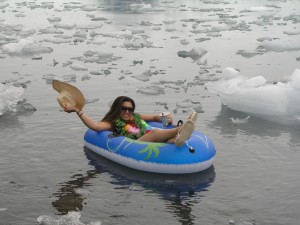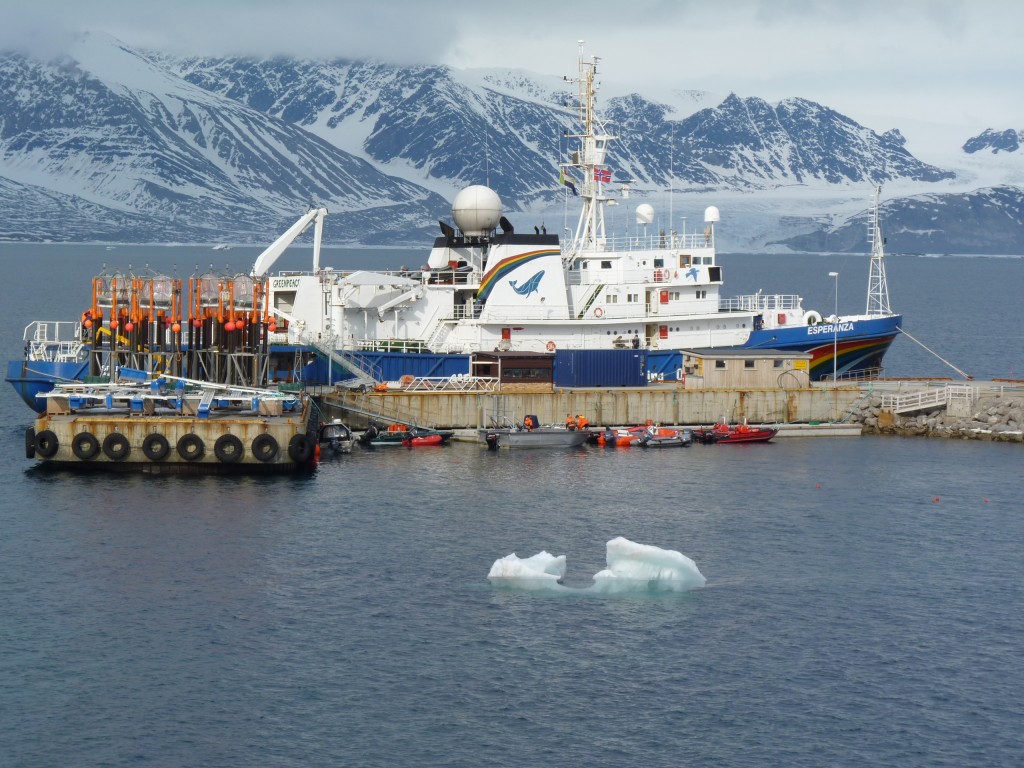Search Results for Tag: ocean acidification
10 years French-German Arctic Station
Congratulations to the team of the joint French-German Arctic research station in Ny Alesund, Svalbard. It is ten years since the German polar authority AWI (Alfred-Wegener Institute for Polar and Marine Research) and its French counterpart IPEV (Institut Polaire Paul Emile Victor) joined forces at the world’s northernmost research base.
The station was my first Arctic destination in 2007, so it has a special significance for me. During the IPY, I was involved in an international radio cooperation to report on polar science, which was how the Ice Blog was born.
Photo gallery from Ny Alesund, “From Pole to Pole”.
AWIPEV is the biggest of the research stations in Ny Alesund, and takes up to 150 scientists from France and Germany in the course of a year.
I visited again in 2010 with a team looking at ocean acidification. Their equipment was transported up by the Greenpeace ship Esperanza, a “first” in terms of cooperation between scientists funded by the EU’s EPOCA programme and the environment group. Greenpeace offered the ship to help out when none of the scientific research vessels was available for the project.
The station has also just been the first to be officially approved by the climate data network GRUAN. Not a terribly attractive acronym, but definitely easier to say/write than the whole title: Global Climate Observing System Reference Upper Air Network. Basically, the idea is to standardize and the measurement of climate parameters around the world so that the figures are really comparable. It was initiated by the World Meteorological Organization, the Intergovernmental Oceanographic Commission, UNESCO, UNEP and the International Council for Science.
Keep up the good work everyone up there at AWIPEV.
Climate talks too slow for Antarctic sea snails

The pteropod, (marine snail) Limacina hilicina antarctica, Photo: Nina Bednarsek
While the climate negotiations continue at a snail’s pace in Doha, marine snails or pteropods in the Antarctic are losing their shells because of ocean acidification. Researchers from the British Antarctic Survey (BAS) and partners have published the first evidence of ocean acidification affecting live marine creatures in the Southern Ocean. Ocean acidification is caused by the uptake of carbon dioxide from the atmosphere emitted as a result of fossil fuel burning.
![]() read more
read more
The Cold Edge – Visualizing polar climate impacts

The Dragon - Dave Walsh - davewalshphoto.com
On board the Greenpeace boat Esperanza at Svalbard for a story on scientists monitoring ocean acidification in 2010, I met Dave Walsh from Ireland, who was on board as Greenpeace press officer. Since then I have discovered his work as a photographer in his own right. These photos are art and appeals for environmental and climate action at the same time. Ice blog followers will enjoy his polar photos, spectacular and somehow moving. “While the frozen regions of our planet have the power to ignite imaginations, for most of the seven billion people on Earth, the Arctic and Antarctic remain abstract and unreachable”, says Dave. “ I’ve been lucky enough to voyage north and south by ship, to experience the serenity of the oceans and polar regions – and realise how finite ourplanet is.”
“The Cold Edge” exhibition of Dave’s pictures opens at The Copper House Gallery in Dublin this evening. I wish I could be there. In the meantime, those of us who can’t be there in person can share some inspiration and (aesthetic) food for thought online. The British newspaper the Guardian also features the pictures.
New climate model says 2° target not out of reach if….

The Hamburg scientists say there is a direct connection between the melting of the Arctic sea ice and global warming
Scientists from the Hamburg-based Max-Planck-Institute of Meteorology and the German Climate Computing Centre have calculated that the 2° limit for global warming could still be kept to. However, it would require immediate drastic reductions in carbon dioxide emissions. So what’s new? I hear you say. The new element is the model the scientists are using. The new model developed by the Max-Planck-Institute using the high-powered computer capacity of the Hamburg centre integrates additional factors into its simulations for the 21st century, including the complex carbon cycle and dynamic role of vegetation, and compares numerous climate models from around the world with each other.The simulations indicate that if the CO2 concentration continues to rise as it is doing, we will be facing not only a considerable rise in temperature, but also an increase in the speed of ocean acidification.
![]() read more
read more
Mission accomplished – data worrying. The Arctic ocean acidification project
I have just heard that the experiment I reported on from Svalbard has been concluded. A press release from Greenpeace quotes Professor Ulf Riebesell from the IFM-GEOMAR Kiel Uni ocean acidification project as saying the experiment was a success.

(I took this pic of Prof. Riebesell watching the deployment of the mesocosms last month, see earlier posts).
That doesn’t mean the news is good:
“Not only do we now have the most comprehensive data set ever on the impacts of ocean acidification in Arctic waters, we have also learned from this experiment that ocean acidification in these waters has a definite impact on the base of the food web, which can have implications for the entire ecosystem.” says Prof. Ulf.
“If we keep emitting CO2 at the current rate, marine organisms will experience changes in ocean acidity beyond anything they have experienced in the last 20 million years of their evolutionary history.”
Worrying times indeed.






















Feedback